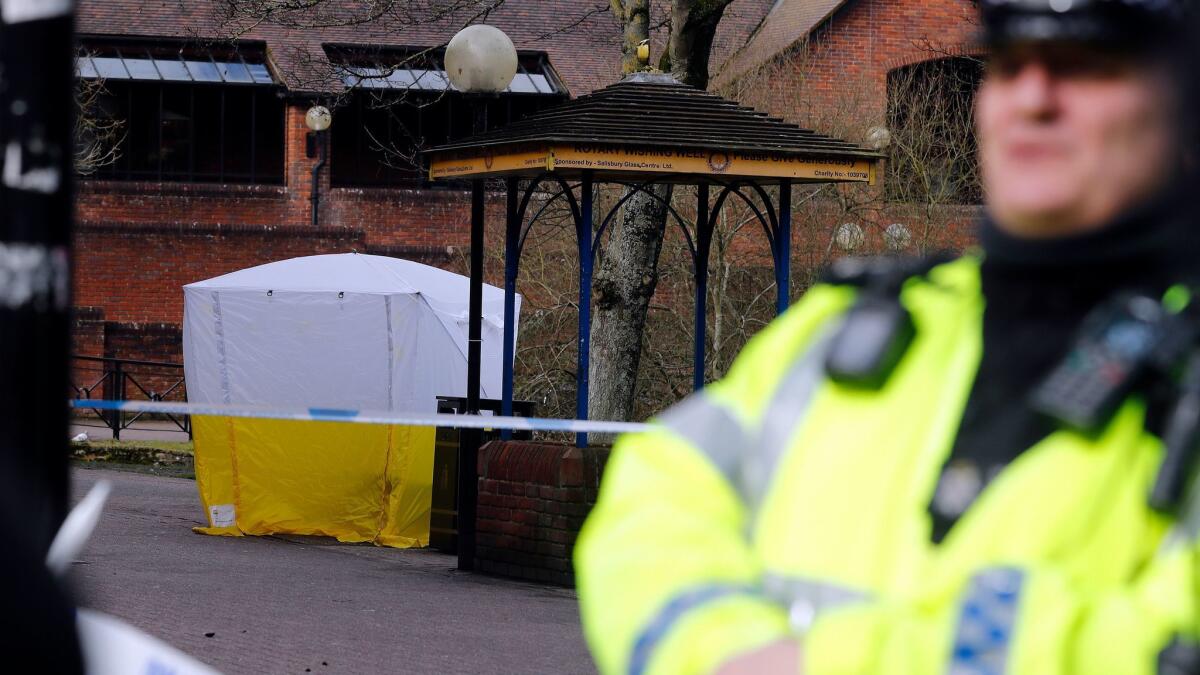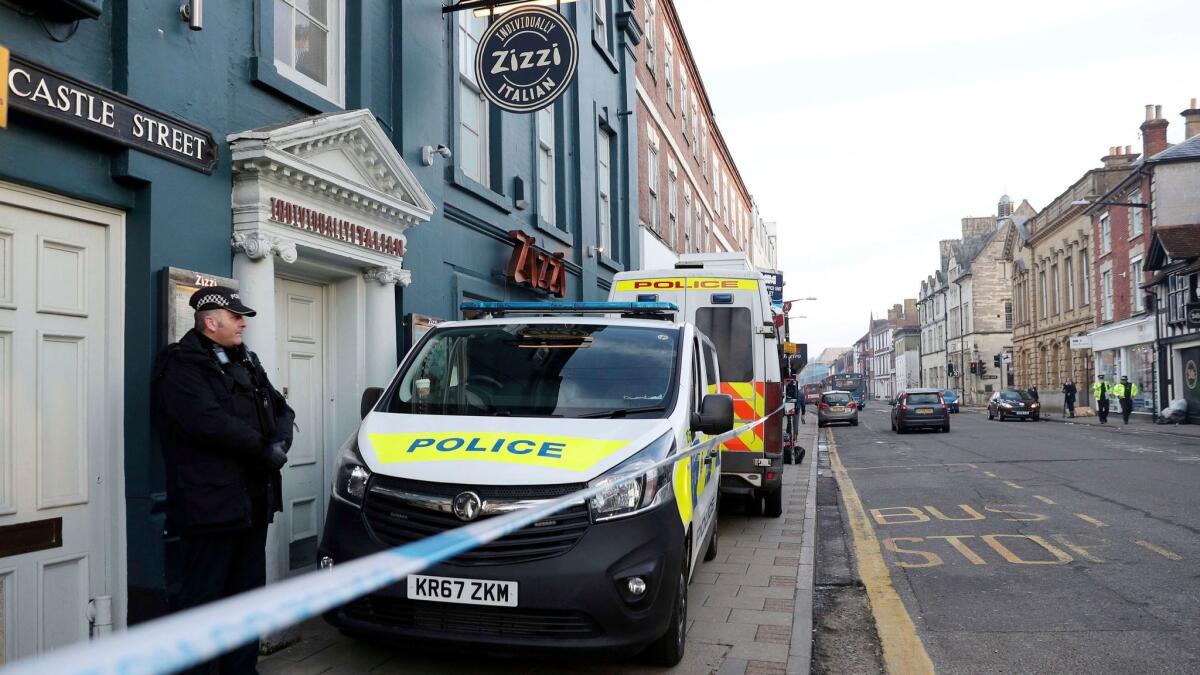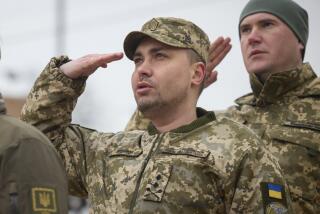Scotland Yard says nerve agent poisoned former Russian spy and his daughter

- Share via
Reporting from London — British police confirmed Wednesday that a potentially deadly nerve agent was used to deliberately attack a former Russian spy and his daughter, and the case is now being treated as attempted murder.
A police officer who was one of the first to attend to the pair after they were found slumped unconscious on a bench near a shopping mall in the picturesque cathedral city of Salisbury has also fallen ill and is currently in serious condition in a hospital intensive care unit.
Police would not identify the specific nerve agent used in the attack, but such toxins are hugely dangerous and sophisticated, and can only be manufactured using specialist training. They typically enter the body through the nose or mouth and attack the nervous system, stopping it from working.
“We believe the two people who originally became unwell were the specific targets,” Assistant Commissioner Mark Rowley, the head of counter-terrorism policing, told reporters outside Scotland Yard in London. “[We] are focused on identifying and finding those responsible.”
The two victims have been widely named as former Russian spy Sergei Skripal, 66, and his daughter, Yulia, 33. They remained in critical condition in intensive care.
Speculation mounted Wednesday that Russia was behind the attack, given the strong similarities to the case of former Russian intelligence officer Alexander Litvinenko, who died from radioactive polonium-210 poisoning in London in 2006. An inquest into Litvinenko’s death pointed the finger of blame at Russian intelligence, and said Russian President Vladimir Putin was likely aware and supportive of the attack.
There have been other cases of people who crossed Russian authorities and wound up dead under mysterious circumstances in Britain, beginning with Bulgarian dissident Georgi Markov, who died in London in 1978 after being jabbed in the leg with a poison-tipped umbrella. The Soviet KGB was widely suspected. Russian oligarch Boris Berezovsky, an outspoken critic of Putin, was found dead in his home in southern England in 2013 with a scarf wrapped around his neck. No cause of death was ever determined.
Russia has strongly denied any involvement in the latest case, branding such accusations part of an anti-Russian campaign, but there is a clear motive.
Skripal is a retired Russian military intelligence officer who was convicted and jailed for being a double agent for British intelligence service MI6. He was released in 2010 during a prisoner swap and had been given refuge in Britain, where he reportedly kept a low profile, but was not using a different identity.

The fact that Russia may have carried out such a brazen attack once again on British soil will be deeply troubling to Prime Minister Theresa May’s government. Her emergency crisis team, Cobra, met Wednesday morning.
“This is likely to be a lengthy and ongoing process,” said Home Secretary Amber Rudd, who chaired the meeting. “We need to keep a cool head and make sure that we collect all the evidence we can and we need to make sure that we respond, not to rumor, but to all the evidence that they collect, and then we will need to decide what action to take.” Foreign secretary Boris Johnson said Tuesday that Britain would respond “robustly” if there was any evidence of Russian state involvement.
Police said the case was being treated as a “major incident” involving hundreds of detectives from the counter-terrorism unit, who were working around the clock alongside specialist health and science experts. Investigators are scouring surveillance footage to determine the pair’s movements in the days and hours before they became unconscious and police cordons have been set up at various locations, including a restaurant and pub they are believed to have visited on Sunday.
The seat where they were found unconscious at around 4:15 p.m. has also been covered with a tent.
Police also appealed for anyone who was in the area on Sunday to come forward.
“Did you see anything out of the ordinary?” Rowley said. “It may be that at the time, nothing appeared out of place or untoward, but with what you now know, you remember something that might be of significance. Your memory of that afternoon and your movements alone could help us with missing pieces of the investigation.”
He also urged anyone who felt unwell to seek medical advice immediately, but did not anticipate a widespread risk to public health.
He added: “Clearly people will be concerned.”
Boyle is a special correspondent.
ALSO:
Britain’s Theresa May has a big ‘Brexit’ headache — and his name is Jeremy Corbyn
On a Moscow bridge, volunteers brave weather and provocateurs to maintain memorial to Boris Nemtsov
UPDATES:
2:45 p.m.: This article has been updated throughout with Los Angeles Times staff reporting.
This article was originally published at 10:30 a.m.
More to Read
Sign up for Essential California
The most important California stories and recommendations in your inbox every morning.
You may occasionally receive promotional content from the Los Angeles Times.










